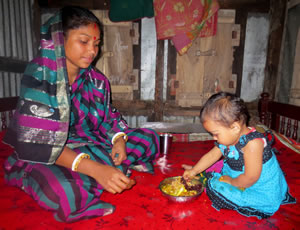
This Phase I report describes a simulation model for early-life nutrition linkages to noncommunicable disease (ELN-NCD) that SPRING developed to yield a more complete understanding of the value of early-life nutrition interventions.
By extending the timeframe for estimating treatment benefits, the ELN-NCD Model seeks to quantify an intervention’s impact both on early-life conditions and on any resulting later-life N-RNCD risk—that is, to account for both short-term benefits (accruing during the period from birth to one year) and long-term benefits (realized from the age of 20 years onward). Inclusion of long-term effects produced an increase in cost effectiveness ratios (CER), with non-trivial additional value coming from improvements in later life health outcomes. Among the various interventions considered, multiple micronutrient supplementation during pregnancy was found to be most cost effective in improving short and long term health outcomes in this cohort.
Download the report (above) to learn more.